Reflective Essay on Nursing: Cultural Competence in Healthcare
VerifiedAdded on 2022/11/28
|6
|1400
|366
Essay
AI Summary
This nursing reflective essay, based on the Gibbs reflective model, explores a clinical experience involving a 93-year-old patient with diabetes mellitus and confusion, who recently moved to a nursing home. The essay highlights the importance of cultural competence and safety in providing care to patients from diverse backgrounds, specifically a patient from Sri Lanka who speaks Sinhala. The author reflects on feelings of empathy, the challenges of language barriers, and the satisfaction derived from patient care. The analysis focuses on the unique needs of elderly diabetic patients and the significance of cultural sensitivity in nursing practice. The essay concludes with a plan to enhance future practice through further study, research, and advocacy for culturally safe nursing environments. The author emphasizes the need for awareness of cultural differences, the impact of language barriers, and the importance of creating a supportive environment for patients and their families. This essay provides a personal reflection on the importance of integrating cultural competence into nursing care.
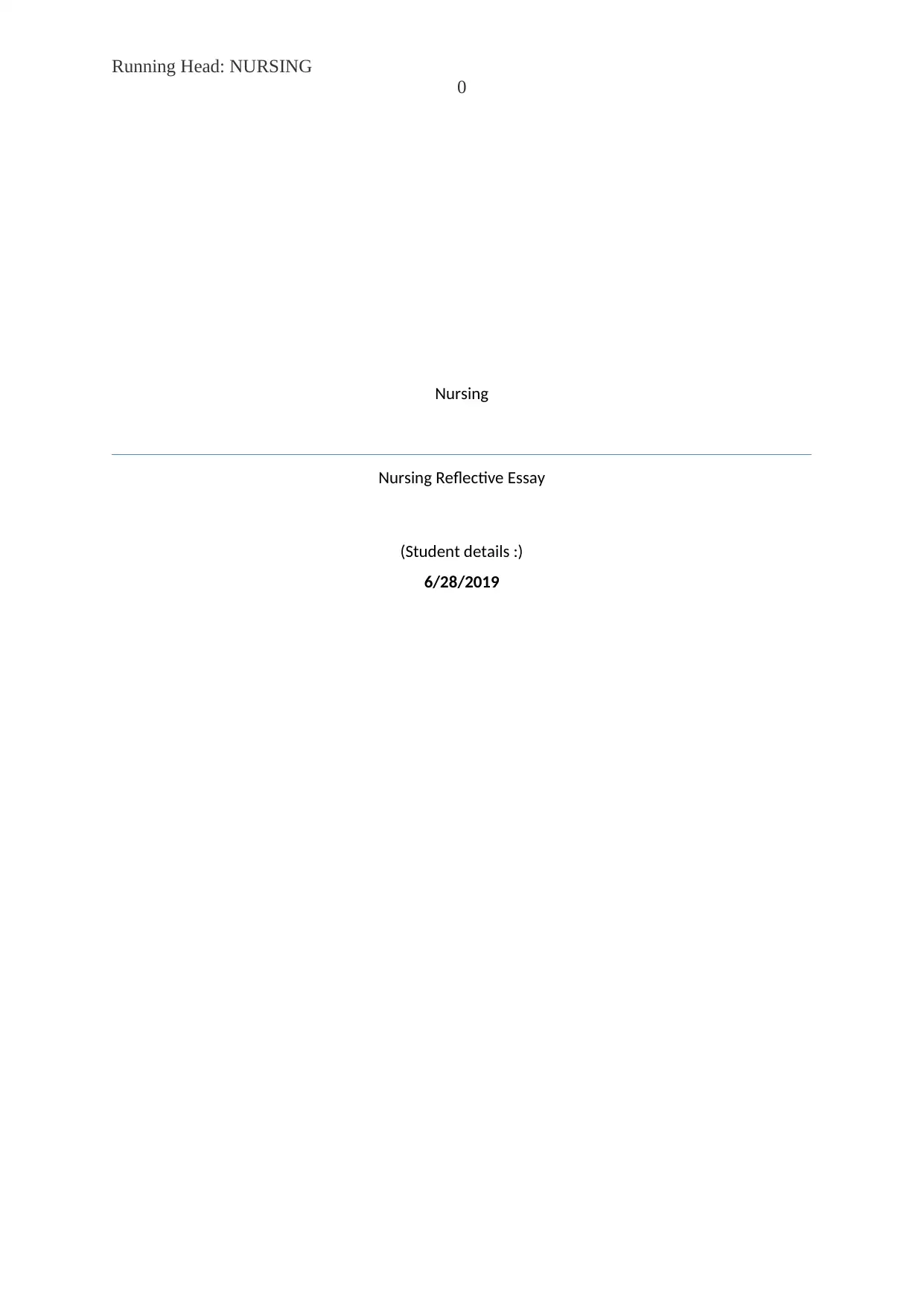
Running Head: NURSING
0
Nursing
Nursing Reflective Essay
(Student details :)
6/28/2019
0
Nursing
Nursing Reflective Essay
(Student details :)
6/28/2019
Paraphrase This Document
Need a fresh take? Get an instant paraphrase of this document with our AI Paraphraser
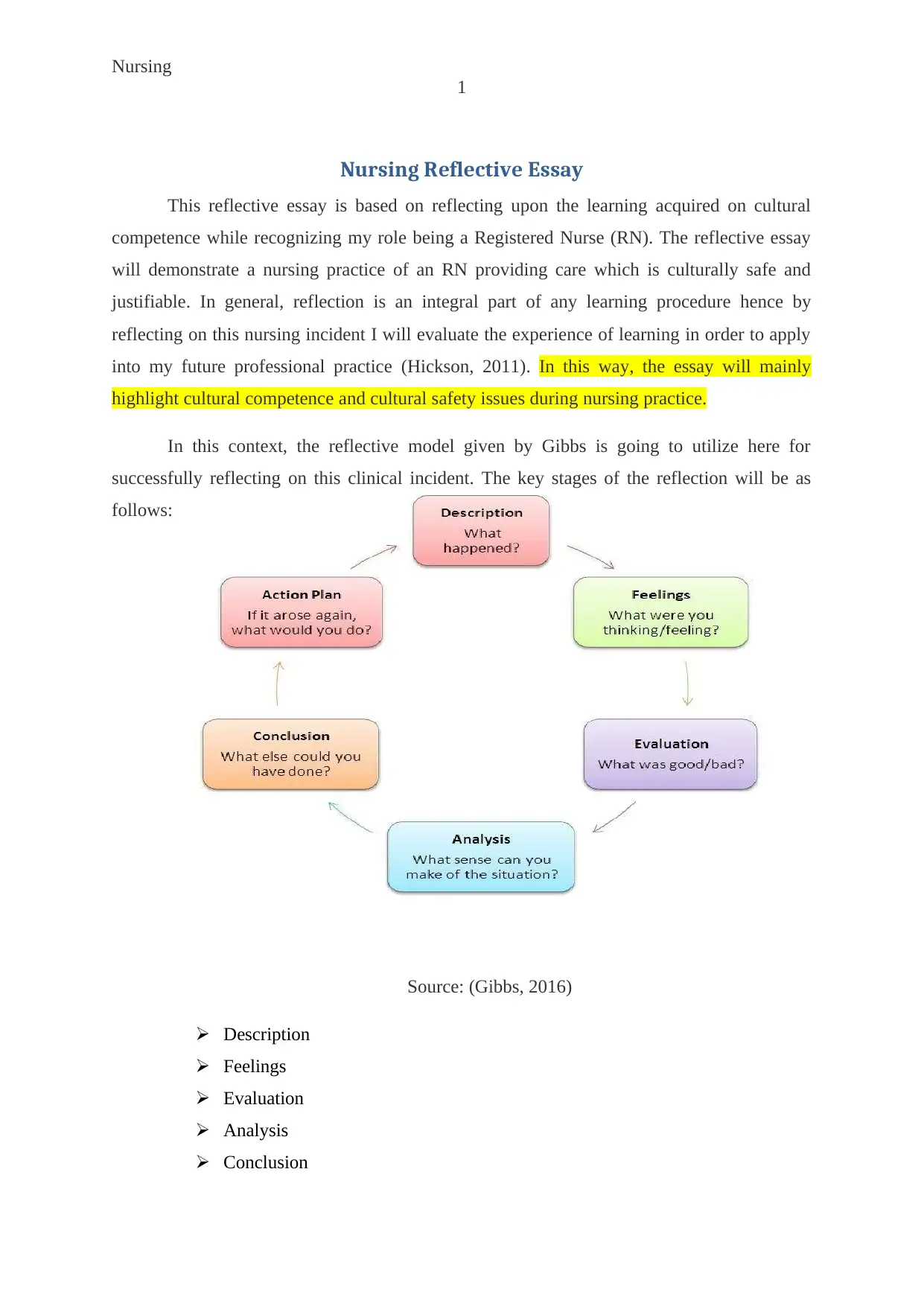
Nursing
1
Nursing Reflective Essay
This reflective essay is based on reflecting upon the learning acquired on cultural
competence while recognizing my role being a Registered Nurse (RN). The reflective essay
will demonstrate a nursing practice of an RN providing care which is culturally safe and
justifiable. In general, reflection is an integral part of any learning procedure hence by
reflecting on this nursing incident I will evaluate the experience of learning in order to apply
into my future professional practice (Hickson, 2011). In this way, the essay will mainly
highlight cultural competence and cultural safety issues during nursing practice.
In this context, the reflective model given by Gibbs is going to utilize here for
successfully reflecting on this clinical incident. The key stages of the reflection will be as
follows:
Source: (Gibbs, 2016)
Description
Feelings
Evaluation
Analysis
Conclusion
1
Nursing Reflective Essay
This reflective essay is based on reflecting upon the learning acquired on cultural
competence while recognizing my role being a Registered Nurse (RN). The reflective essay
will demonstrate a nursing practice of an RN providing care which is culturally safe and
justifiable. In general, reflection is an integral part of any learning procedure hence by
reflecting on this nursing incident I will evaluate the experience of learning in order to apply
into my future professional practice (Hickson, 2011). In this way, the essay will mainly
highlight cultural competence and cultural safety issues during nursing practice.
In this context, the reflective model given by Gibbs is going to utilize here for
successfully reflecting on this clinical incident. The key stages of the reflection will be as
follows:
Source: (Gibbs, 2016)
Description
Feelings
Evaluation
Analysis
Conclusion
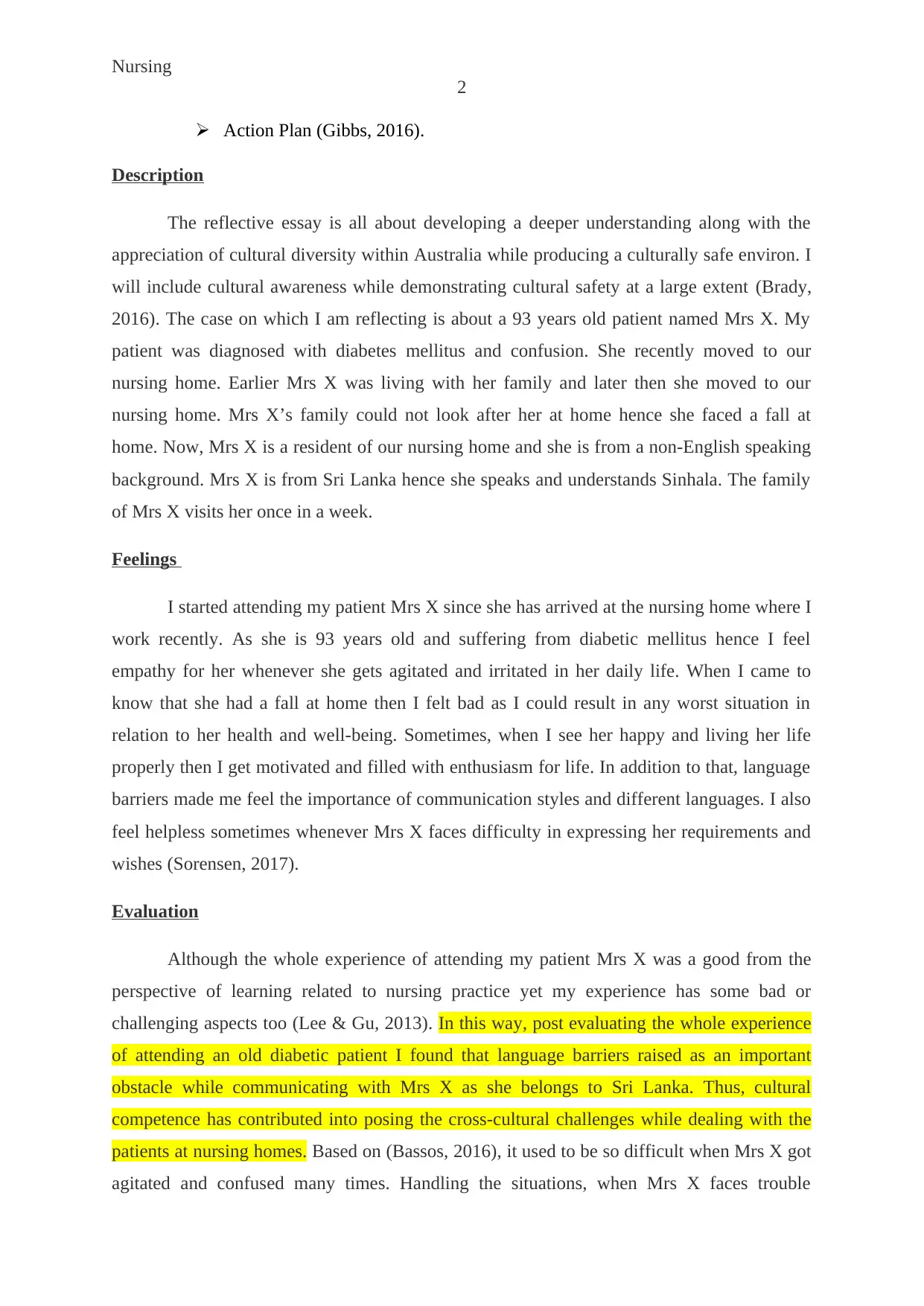
Nursing
2
Action Plan (Gibbs, 2016).
Description
The reflective essay is all about developing a deeper understanding along with the
appreciation of cultural diversity within Australia while producing a culturally safe environ. I
will include cultural awareness while demonstrating cultural safety at a large extent (Brady,
2016). The case on which I am reflecting is about a 93 years old patient named Mrs X. My
patient was diagnosed with diabetes mellitus and confusion. She recently moved to our
nursing home. Earlier Mrs X was living with her family and later then she moved to our
nursing home. Mrs X’s family could not look after her at home hence she faced a fall at
home. Now, Mrs X is a resident of our nursing home and she is from a non-English speaking
background. Mrs X is from Sri Lanka hence she speaks and understands Sinhala. The family
of Mrs X visits her once in a week.
Feelings
I started attending my patient Mrs X since she has arrived at the nursing home where I
work recently. As she is 93 years old and suffering from diabetic mellitus hence I feel
empathy for her whenever she gets agitated and irritated in her daily life. When I came to
know that she had a fall at home then I felt bad as I could result in any worst situation in
relation to her health and well-being. Sometimes, when I see her happy and living her life
properly then I get motivated and filled with enthusiasm for life. In addition to that, language
barriers made me feel the importance of communication styles and different languages. I also
feel helpless sometimes whenever Mrs X faces difficulty in expressing her requirements and
wishes (Sorensen, 2017).
Evaluation
Although the whole experience of attending my patient Mrs X was a good from the
perspective of learning related to nursing practice yet my experience has some bad or
challenging aspects too (Lee & Gu, 2013). In this way, post evaluating the whole experience
of attending an old diabetic patient I found that language barriers raised as an important
obstacle while communicating with Mrs X as she belongs to Sri Lanka. Thus, cultural
competence has contributed into posing the cross-cultural challenges while dealing with the
patients at nursing homes. Based on (Bassos, 2016), it used to be so difficult when Mrs X got
agitated and confused many times. Handling the situations, when Mrs X faces trouble
2
Action Plan (Gibbs, 2016).
Description
The reflective essay is all about developing a deeper understanding along with the
appreciation of cultural diversity within Australia while producing a culturally safe environ. I
will include cultural awareness while demonstrating cultural safety at a large extent (Brady,
2016). The case on which I am reflecting is about a 93 years old patient named Mrs X. My
patient was diagnosed with diabetes mellitus and confusion. She recently moved to our
nursing home. Earlier Mrs X was living with her family and later then she moved to our
nursing home. Mrs X’s family could not look after her at home hence she faced a fall at
home. Now, Mrs X is a resident of our nursing home and she is from a non-English speaking
background. Mrs X is from Sri Lanka hence she speaks and understands Sinhala. The family
of Mrs X visits her once in a week.
Feelings
I started attending my patient Mrs X since she has arrived at the nursing home where I
work recently. As she is 93 years old and suffering from diabetic mellitus hence I feel
empathy for her whenever she gets agitated and irritated in her daily life. When I came to
know that she had a fall at home then I felt bad as I could result in any worst situation in
relation to her health and well-being. Sometimes, when I see her happy and living her life
properly then I get motivated and filled with enthusiasm for life. In addition to that, language
barriers made me feel the importance of communication styles and different languages. I also
feel helpless sometimes whenever Mrs X faces difficulty in expressing her requirements and
wishes (Sorensen, 2017).
Evaluation
Although the whole experience of attending my patient Mrs X was a good from the
perspective of learning related to nursing practice yet my experience has some bad or
challenging aspects too (Lee & Gu, 2013). In this way, post evaluating the whole experience
of attending an old diabetic patient I found that language barriers raised as an important
obstacle while communicating with Mrs X as she belongs to Sri Lanka. Thus, cultural
competence has contributed into posing the cross-cultural challenges while dealing with the
patients at nursing homes. Based on (Bassos, 2016), it used to be so difficult when Mrs X got
agitated and confused many times. Handling the situations, when Mrs X faces trouble
⊘ This is a preview!⊘
Do you want full access?
Subscribe today to unlock all pages.

Trusted by 1+ million students worldwide
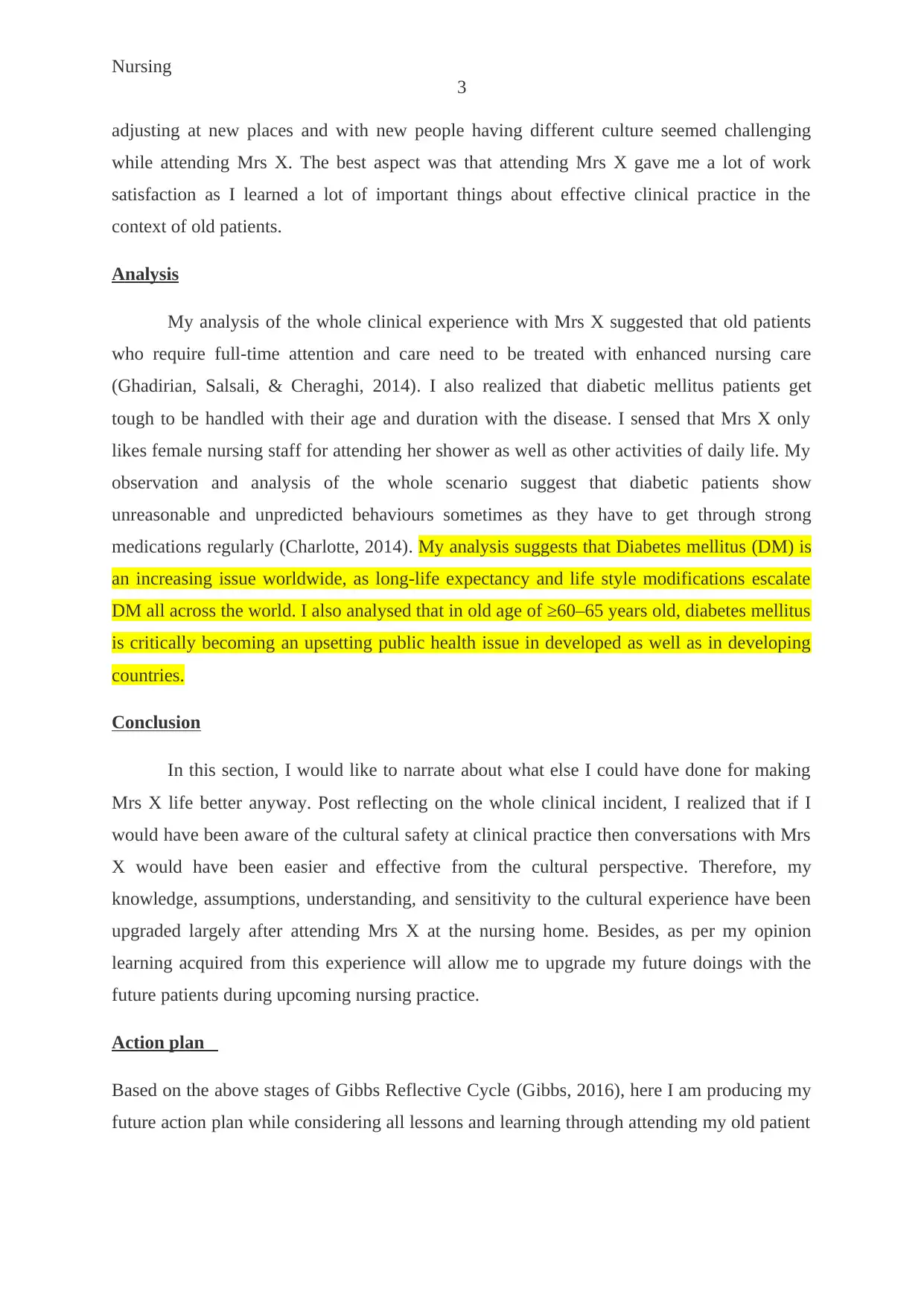
Nursing
3
adjusting at new places and with new people having different culture seemed challenging
while attending Mrs X. The best aspect was that attending Mrs X gave me a lot of work
satisfaction as I learned a lot of important things about effective clinical practice in the
context of old patients.
Analysis
My analysis of the whole clinical experience with Mrs X suggested that old patients
who require full-time attention and care need to be treated with enhanced nursing care
(Ghadirian, Salsali, & Cheraghi, 2014). I also realized that diabetic mellitus patients get
tough to be handled with their age and duration with the disease. I sensed that Mrs X only
likes female nursing staff for attending her shower as well as other activities of daily life. My
observation and analysis of the whole scenario suggest that diabetic patients show
unreasonable and unpredicted behaviours sometimes as they have to get through strong
medications regularly (Charlotte, 2014). My analysis suggests that Diabetes mellitus (DM) is
an increasing issue worldwide, as long-life expectancy and life style modifications escalate
DM all across the world. I also analysed that in old age of ≥60–65 years old, diabetes mellitus
is critically becoming an upsetting public health issue in developed as well as in developing
countries.
Conclusion
In this section, I would like to narrate about what else I could have done for making
Mrs X life better anyway. Post reflecting on the whole clinical incident, I realized that if I
would have been aware of the cultural safety at clinical practice then conversations with Mrs
X would have been easier and effective from the cultural perspective. Therefore, my
knowledge, assumptions, understanding, and sensitivity to the cultural experience have been
upgraded largely after attending Mrs X at the nursing home. Besides, as per my opinion
learning acquired from this experience will allow me to upgrade my future doings with the
future patients during upcoming nursing practice.
Action plan
Based on the above stages of Gibbs Reflective Cycle (Gibbs, 2016), here I am producing my
future action plan while considering all lessons and learning through attending my old patient
3
adjusting at new places and with new people having different culture seemed challenging
while attending Mrs X. The best aspect was that attending Mrs X gave me a lot of work
satisfaction as I learned a lot of important things about effective clinical practice in the
context of old patients.
Analysis
My analysis of the whole clinical experience with Mrs X suggested that old patients
who require full-time attention and care need to be treated with enhanced nursing care
(Ghadirian, Salsali, & Cheraghi, 2014). I also realized that diabetic mellitus patients get
tough to be handled with their age and duration with the disease. I sensed that Mrs X only
likes female nursing staff for attending her shower as well as other activities of daily life. My
observation and analysis of the whole scenario suggest that diabetic patients show
unreasonable and unpredicted behaviours sometimes as they have to get through strong
medications regularly (Charlotte, 2014). My analysis suggests that Diabetes mellitus (DM) is
an increasing issue worldwide, as long-life expectancy and life style modifications escalate
DM all across the world. I also analysed that in old age of ≥60–65 years old, diabetes mellitus
is critically becoming an upsetting public health issue in developed as well as in developing
countries.
Conclusion
In this section, I would like to narrate about what else I could have done for making
Mrs X life better anyway. Post reflecting on the whole clinical incident, I realized that if I
would have been aware of the cultural safety at clinical practice then conversations with Mrs
X would have been easier and effective from the cultural perspective. Therefore, my
knowledge, assumptions, understanding, and sensitivity to the cultural experience have been
upgraded largely after attending Mrs X at the nursing home. Besides, as per my opinion
learning acquired from this experience will allow me to upgrade my future doings with the
future patients during upcoming nursing practice.
Action plan
Based on the above stages of Gibbs Reflective Cycle (Gibbs, 2016), here I am producing my
future action plan while considering all lessons and learning through attending my old patient
Paraphrase This Document
Need a fresh take? Get an instant paraphrase of this document with our AI Paraphraser
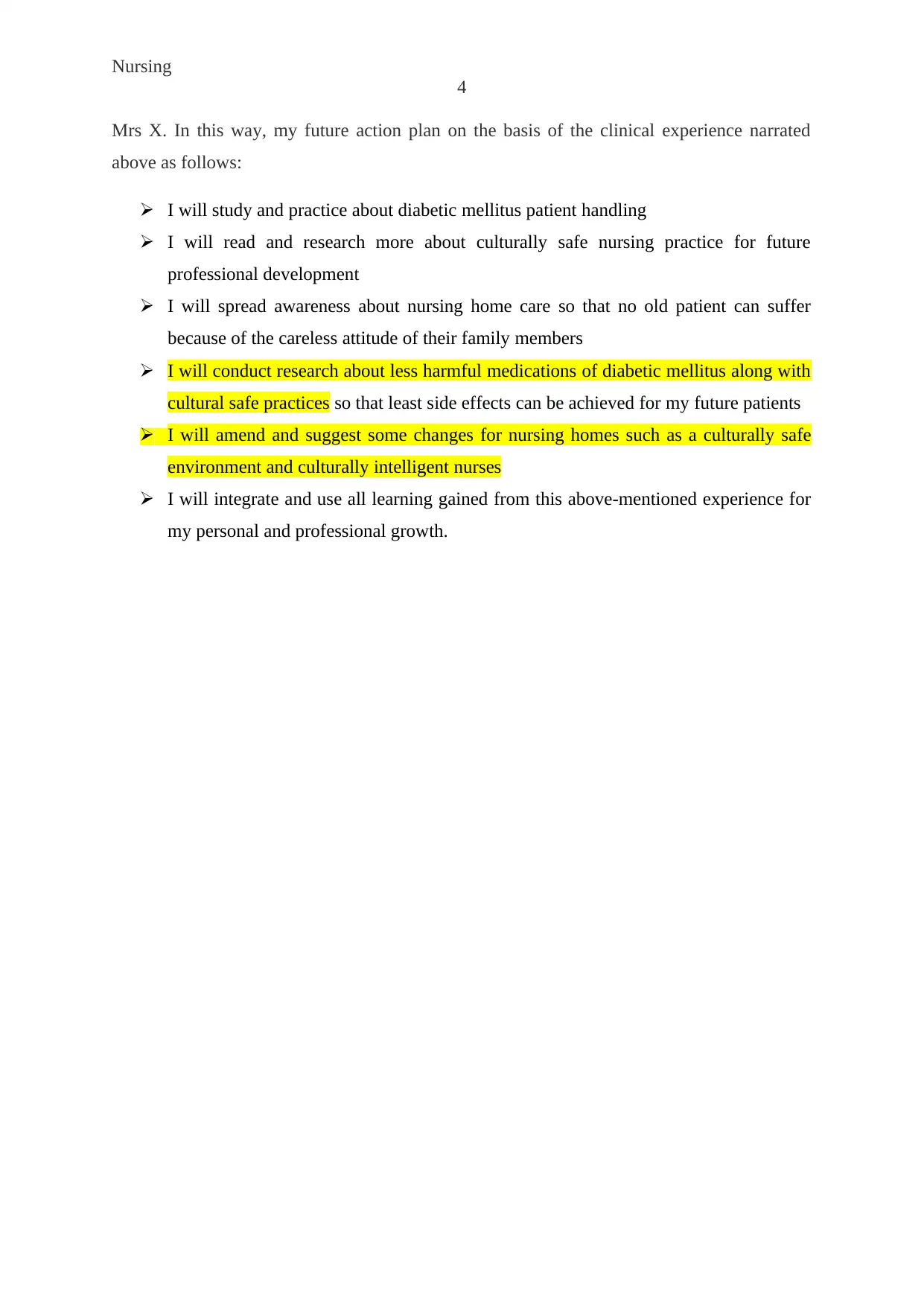
Nursing
4
Mrs X. In this way, my future action plan on the basis of the clinical experience narrated
above as follows:
I will study and practice about diabetic mellitus patient handling
I will read and research more about culturally safe nursing practice for future
professional development
I will spread awareness about nursing home care so that no old patient can suffer
because of the careless attitude of their family members
I will conduct research about less harmful medications of diabetic mellitus along with
cultural safe practices so that least side effects can be achieved for my future patients
I will amend and suggest some changes for nursing homes such as a culturally safe
environment and culturally intelligent nurses
I will integrate and use all learning gained from this above-mentioned experience for
my personal and professional growth.
4
Mrs X. In this way, my future action plan on the basis of the clinical experience narrated
above as follows:
I will study and practice about diabetic mellitus patient handling
I will read and research more about culturally safe nursing practice for future
professional development
I will spread awareness about nursing home care so that no old patient can suffer
because of the careless attitude of their family members
I will conduct research about less harmful medications of diabetic mellitus along with
cultural safe practices so that least side effects can be achieved for my future patients
I will amend and suggest some changes for nursing homes such as a culturally safe
environment and culturally intelligent nurses
I will integrate and use all learning gained from this above-mentioned experience for
my personal and professional growth.
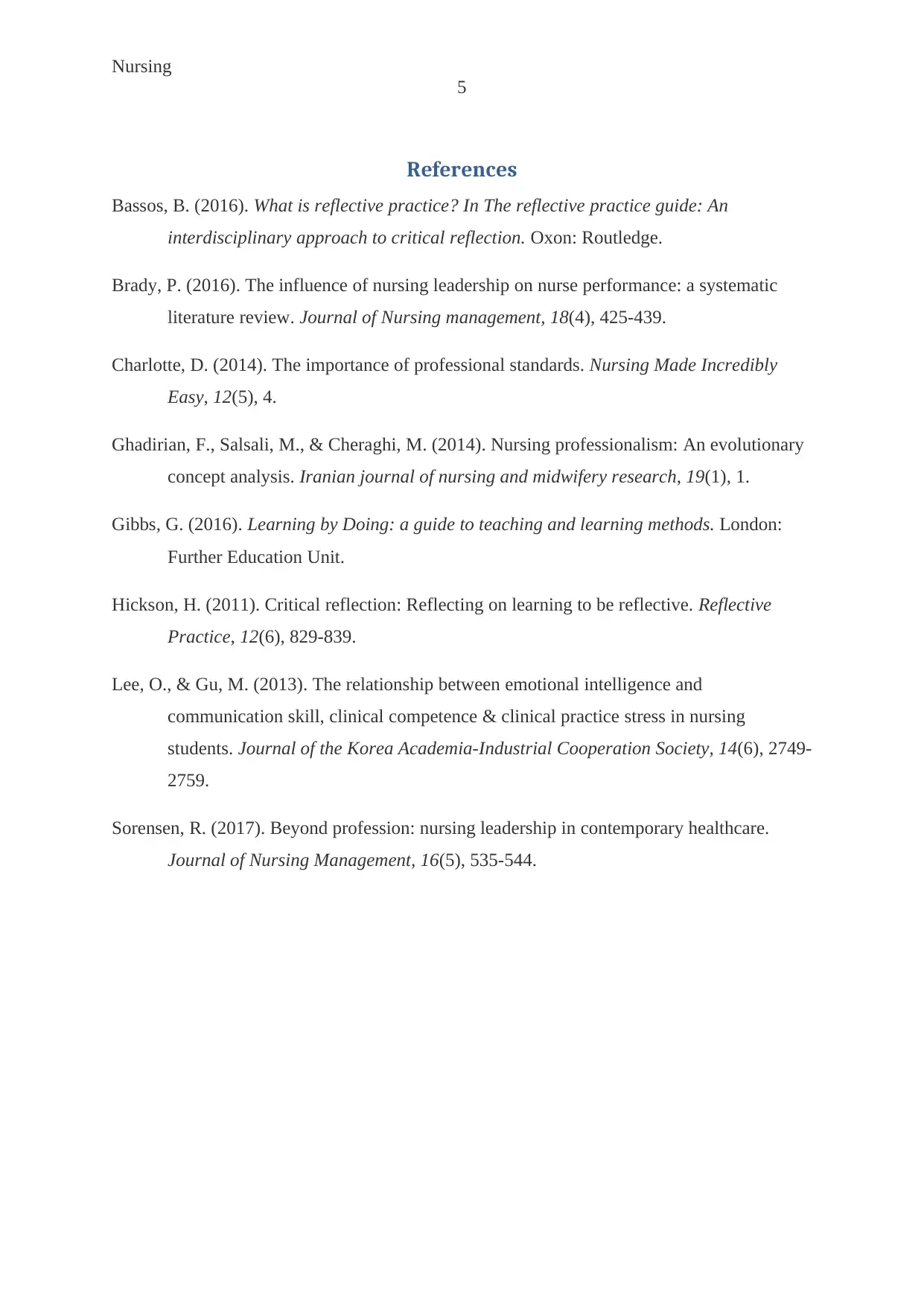
Nursing
5
References
Bassos, B. (2016). What is reflective practice? In The reflective practice guide: An
interdisciplinary approach to critical reflection. Oxon: Routledge.
Brady, P. (2016). The influence of nursing leadership on nurse performance: a systematic
literature review. Journal of Nursing management, 18(4), 425-439.
Charlotte, D. (2014). The importance of professional standards. Nursing Made Incredibly
Easy, 12(5), 4.
Ghadirian, F., Salsali, M., & Cheraghi, M. (2014). Nursing professionalism: An evolutionary
concept analysis. Iranian journal of nursing and midwifery research, 19(1), 1.
Gibbs, G. (2016). Learning by Doing: a guide to teaching and learning methods. London:
Further Education Unit.
Hickson, H. (2011). Critical reflection: Reflecting on learning to be reflective. Reflective
Practice, 12(6), 829-839.
Lee, O., & Gu, M. (2013). The relationship between emotional intelligence and
communication skill, clinical competence & clinical practice stress in nursing
students. Journal of the Korea Academia-Industrial Cooperation Society, 14(6), 2749-
2759.
Sorensen, R. (2017). Beyond profession: nursing leadership in contemporary healthcare.
Journal of Nursing Management, 16(5), 535-544.
5
References
Bassos, B. (2016). What is reflective practice? In The reflective practice guide: An
interdisciplinary approach to critical reflection. Oxon: Routledge.
Brady, P. (2016). The influence of nursing leadership on nurse performance: a systematic
literature review. Journal of Nursing management, 18(4), 425-439.
Charlotte, D. (2014). The importance of professional standards. Nursing Made Incredibly
Easy, 12(5), 4.
Ghadirian, F., Salsali, M., & Cheraghi, M. (2014). Nursing professionalism: An evolutionary
concept analysis. Iranian journal of nursing and midwifery research, 19(1), 1.
Gibbs, G. (2016). Learning by Doing: a guide to teaching and learning methods. London:
Further Education Unit.
Hickson, H. (2011). Critical reflection: Reflecting on learning to be reflective. Reflective
Practice, 12(6), 829-839.
Lee, O., & Gu, M. (2013). The relationship between emotional intelligence and
communication skill, clinical competence & clinical practice stress in nursing
students. Journal of the Korea Academia-Industrial Cooperation Society, 14(6), 2749-
2759.
Sorensen, R. (2017). Beyond profession: nursing leadership in contemporary healthcare.
Journal of Nursing Management, 16(5), 535-544.
⊘ This is a preview!⊘
Do you want full access?
Subscribe today to unlock all pages.

Trusted by 1+ million students worldwide
1 out of 6
Related Documents
Your All-in-One AI-Powered Toolkit for Academic Success.
+13062052269
info@desklib.com
Available 24*7 on WhatsApp / Email
![[object Object]](/_next/static/media/star-bottom.7253800d.svg)
Unlock your academic potential
Copyright © 2020–2026 A2Z Services. All Rights Reserved. Developed and managed by ZUCOL.





